Acting on the Genome
Although there has been much discussion in recent months about the promise of precision medicine to improve outcomes for patients with cancer, the challenges and complexities of reaching that goal become strikingly evident as soon as we start trying to individualize therapies based on molecularly identified targets.
OncLive Chairman,
Mike Hennessy
Although there has been much discussion in recent months about the promise of precision medicine to improve outcomes for patients with cancer, the challenges and complexities of reaching that goal become strikingly evident as soon as we start trying to individualize therapies based on molecularly identified targets.
The difficulties associated with translating molecular findings into clinically actionable treatment is an underlying theme of several articles in this issue of OncologyLive®. In our cover story, “Genomic Findings Reshaping CRC Field,” we report on some of the key study results that are changing the views that leading colorectal cancer (CRC) experts have about approaches to the disease.
The molecular mutation landscape in CRC has been studied more extensively than most solid tumors, yet we still have much to learn about the prevalence of some of the most widely known aberrations and the significance of the defects. For example, the observation by Venook and colleagues that patients with left-sided tumors experience better outcomes than those with right-sided malignancies was truly practice changing. These findings not only have been correlated with responses to therapies but also have helped spawn many studies into the molecular profile of CRC based on body site location.
Identifying molecular aberrations, however, is only part of the mission. Determining what these aberrations mean is another. For example, the incidence and variety of mutations in patients with CRC appears broader than initially believed but Matthew B. Yurgelun, MD, lead author of a study that reported these findings, cautions that the importance of some of the mutations identified has not yet been clarified.
Larry Norton, MD, a Giants of Cancer Care® award winner, adds a larger theoretical issue to the picture in “Butterfly Effect May Foil Genomic Medicine” in our Precision Medicine in Oncology® section. Norton, who has helped define the mutational landscape in breast cancer, uses the butterfly concept from mathematical chaos theory to illustrate the unpredictable and potentially largescale impact that a small change in a complex system can have. The message here is not to get carried away with expectations for precision medicine.
Finally, Maurie Markman, MD, our editor in chief, tackles an eminently practical aspect of the molecular era. There is so much to be learned from genetic panel testing of patients with cancer, yet insurers are reluctant to pay for it. Even amid the ongoing acrimonious debate over healthcare in this country, we must find a way to address this problem so that we can help cancer care move forward.
Please let us know what you think about these matters by contacting managing editor Anita Shaffer at ashaffer@onclive.com. And thank you for reading.




